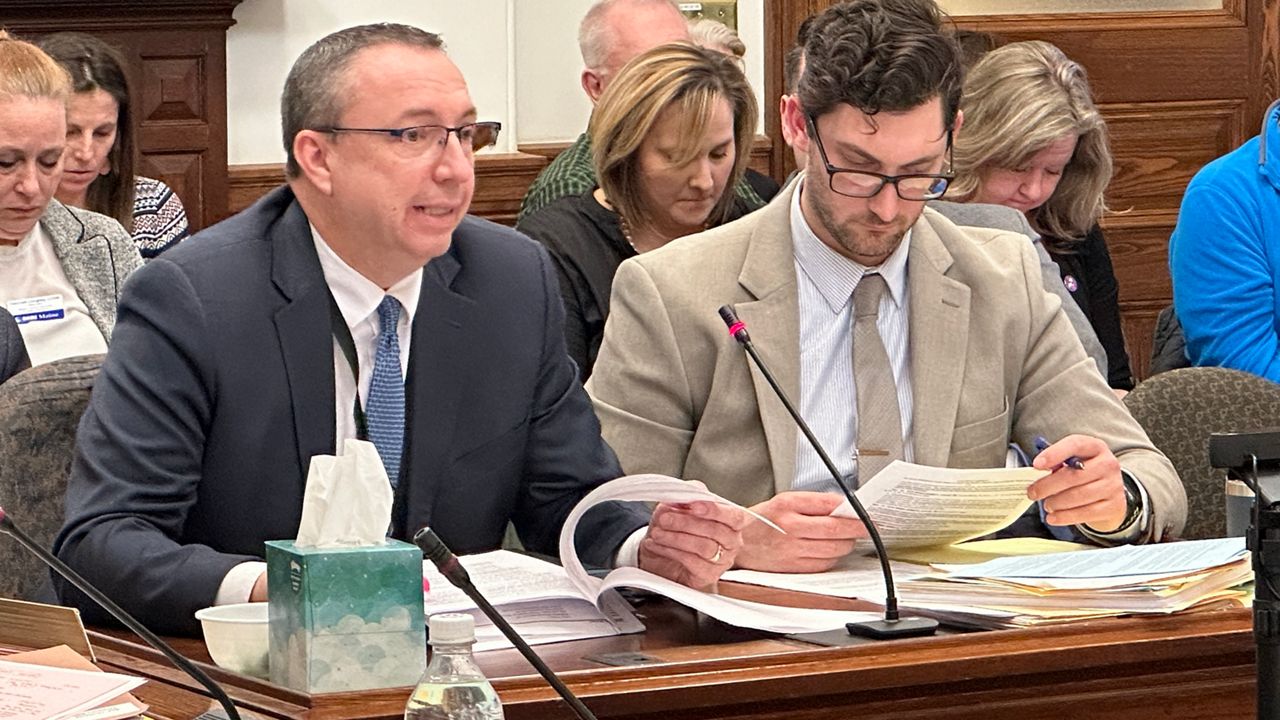State lawmakers continued consideration Thursday of a bill to strengthen mental health and gun background checks put forward by Gov. Janet Mills in the wake of the Lewiston mass shootings.
The Judiciary Committee reviewed suggested changes — most of them minor — from the judicial branch and prosecutors.
But committee chairman Rep. Matt Moonen (D-Portland) said the committee needs more time to make sure all areas are addressed and they voted unanimously to delay the vote.
Mills sent the bill to lawmakers following the Oct. 25 mass shootings in Lewiston that claimed the lives of 18 and injured 13 at a bowling alley and a bar.
It’s one of several gun-related bills now pending before lawmakers, including a proposed 72-hour waiting period and a measure to ban “bump stocks” that enable guns to fire more bullets more quickly.
In her State of the State address, Mills said she wants to take steps to try to prevent future tragedies, while also respecting “our culture and our longstanding traditions.”
The bill, LD 2224, proposes to do several things:
- Requires a background check for an advertised private sale of a firearm;
- Changes the state’s “yellow flag” law so police can ask a judge for a warrant to take someone into custody if they have evidence that the person suffers from mental illness, has access to weapons and “presents a likelihood of serious harm;”
- Increases the penalty for “recklessly, knowingly or intentionally” selling a firearm to a person who is prohibited from having one;
- Requires the state to create a statewide network of crisis receiving centers to provide mental health and substance use disorder services.
The committee deliberations came amid allegations of an improper meeting held Wednesday between an official with the federal Bureau of Alcohol, Tobacco and Firearms and Democrats on the committee.
A group called Gun Owners of Maine filed an ethics complaint with the state Ethics Commission alleging that Sen. Anne Carney (D-Cape Elizabeth) violated state Freedom of Access laws by holding the meeting with more than three other committee members.
The group questioned the “closed door meeting” with James Vann, deputy assistant director with the ATF.
“We hold that the meeting was held to directly address and influence pending legislation before the Judiciary Committee, that this information should have been public, and if Mr. Vann was not willing to meet on the public record no such meeting should have occurred,” according to the complaint filed by Laura Whitcomb, president of the group.
Senate Democrats pushed back on that characterization, saying that the ATF was invited to give the committee an overview of firearm regulations in a public session.

However, the ATF official said he did not want the meeting to be public, so Democrats met with him in a “private caucus” which is allowed under the state’s open meetings law, according to the Office of the Attorney General.
Legislative committees routinely break for partisan caucuses in which members of each party meet separately — and privately — to discuss pending legislation.
In a statement, Senate President Troy Jackson’s office said they have reached out to the federal government to ask if a federal ATF representative can be given clearance to offer the same information in a public session.
The tension around the governor’s bill and several other gun-related measures pending before lawmakers is an indication of the continued divide on gun rights.
David Trahan, executive director of the Sportsman’s Alliance of Maine, said the interim investigative report on the shootings released last week further confirmed his belief that failures by law enforcement — not weak gun laws — are to blame for the tragedy.
The report concluded that the Sagadahoc County Sheriff’s Office had ample evidence that Army reservist Robert Card, 40, of Bowdoin, was a threat to the community and should have been taken into custody the month before the deadliest mass shooting in state history.
In mid-September, the department knew Card suffered from a serious mental illness, had recently spent time in a psychiatric facility, had access to 10-15 firearms, had “assaulted his friend days earlier,” had threatened to “shoot up” the Army reserve drill center in Saco and had threatened the Army personnel who took him to the hospital, according to the report.
Trahan said while he supports some of the efforts to boost mental health services proposed by the governor and others, he worries about overreach on gun regulations.
In particular, he cited concerns with a bill that proposes to institute a 72-hour waiting period between when someone buys a firearm and when they can take possession of it.
He used the Lewiston shootings as an example, saying that thousands of Mainers were in lockdown for two days while police searched for Card.
“It is really fair to ask Maine people who are in lockdown with an individual like Card on the streets, we don’t know where he is, to wait three days to buy a firearm to protect their family?” he said. “So you may think you might prevent a suicide, but at the same time you’re taking away a person’s ability to protect their family.”
On a separate issue, all five Republicans on the Judiciary Committee voted Thursday against a measure that proposes to create a study committee to examine whether Maine should create a system where a person can voluntarily waive their right to purchase or receive a firearm.
Six Democrats voted in favor, which will advance the bill to the full House. Rep. Amy Kuhn (D-Falmouth) said the bill could help save lives.
“I think this one is potentially a tool for families and individuals who are safety planning and may be in crisis,” she said.
Sen. Eric Brakey (R-Auburn) opposed the bill because he said it could set up a system where someone’s name is forever linked to a firearm restriction, even after their mental health crisis resolves.
“What guarantee is there that no permanent record would remain after an individual unenrolls from this voluntary system?” he asked.



